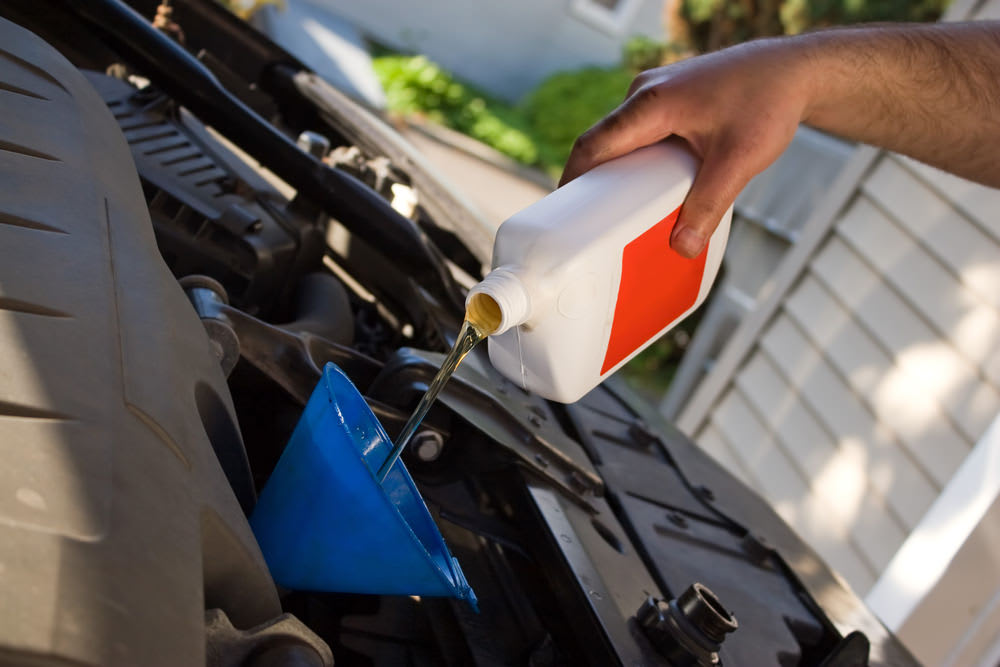

Although most of today's new cars, trucks and SUV's have synthetic oil inside their engines, there are still a few that utilize conventional motor oil as their primary source of lubrication. A commonly asked question here at YourMechanic.com is whether or not you can switch between regular and synthetic motor oil when you have your oil change completed.
The truth is - this is not a cut and dry, yes or no answer. In fact, depending on your individual application, the swap from conventional to synthetic or vice-versa may cause more harm than it's worth. In order to simplify the equation and to provide you with facts so you can make an informed decision, let's review some of the facts about oil changing with synthetic and conventional oil sold in the United States today.
What is Synthetic Oil?
Synthetic oil is made from chemical compounds that contain some petroleum elements combined with highly refined crude oil, organic, and inorganic compounds. In addition to synthetic oils, there are also synthetic blends that combine synthetic oils with traditional petroleum-based oils.
Synthetic motor oils were developed to address a major problem all combustion engines deal with each time they are started: oil and solvents do not mix well together. Engine oil is designed to lubricate moving parts inside the engine, especially around the combustion chamber. However, most fuels are petroleum based and are solvents, which literally wash away conventional oil which coats components.
Lubrication is especially important during start-up, as up to 75% of engine wear occurs as the engine warms up. Synthetic motor oils like Castrol GTX Magnatec provide a protective layer of thin lubrication on metallic components so they maintain lubrication for longer periods of time. As such, most synthetic oils have distinct advantages over regular motor oil, including:
- Better high and low viscosity performance
- Decreased evaporation
- Resistant to oxidation and sludge issues
- Improved lubrication during extreme cold weather
- Improved horsepower and torque
- Increased fuel economy
Synthetic oil typically lasts longer than conventional motor oil, which can reduce overall costs or at least help justify the higher price tag that comes with synthetic oils. For example, a person might change his or her oil every 3,000 miles with regular oil and only every 5,000 miles with synthetic oil.
Switching to Synthetic Oil from Conventional
When synthetic oil was originally developed it was meant to be used only in engines engineered to be specifically compatible with it. Older synthetic oils used esters, which are chemical compounds mixed with alcohol, and were harder on the components, including engine seals and gaskets. The esters would cause wear and create oil leakage, and potentially overheating problems. Today’s synthetic oils use less alcohol compounds, and engine gaskets and seals are made to withstand synthetic oils.
In general, there are three primary benefits to switching from conventional to synthetic oil:
- To reduce oil change intervals
- To remove carbon deposits on moving internal engine components (like cylinder head valves)
- To extend engine life
As you made the switch from conventional to synthetic, it is recommended to do this progressively. Here are a few tips to consider:
- For the first oil and filter change, switch from conventional to conventional/synthetic blend. Continue with synthetic/conventional blend for at least two other oil changes.
- Always replace the oil filter anytime you change engine oil.
- On the third oil change, switch from the conventional/synthetic blend to full synthetic.
The one thing you do not want to change is the recommended oil weight or viscosity. If the above process is followed, it should be safe to switch from regular to synthetic or use a synthetic blend as long as you use the same weight of oil.
Concerns About Switching to Synthetic Oil
Most newer model vehicles will adapt to the change with no problem. However, older models with high mileage may not adjust to the change. Their engine seals are likely to be thinner and worn, and you may find that they start burning oil as it seeps into the combustion chamber. Castrol EDGE High Mileage is a synthetic oil specifically designed for engines with lots of miles, but it is important to consult your owner’s manual or ask a trusted technician before making the switch in your vehicle.
No matter what type of oil you use, regular maintenance with oil changes is essential to extending the life of your engine. Follow the guidelines by the manufacturer or ask the technician how often you should have your oil changed based on the make and model and how the vehicle is used.



